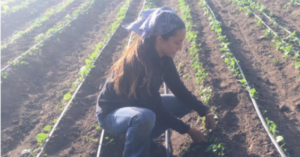
Aysha Peterson in field
November 3, 2020 – Organic farming systems are knowledge-intensive and require farmers to understand a wide range of agroecological practices to build soil health, the foundation of a successful farming system. Yet, the current structure of U.S. agriculture makes it difficult for racial minority farmers to access educational resources and technical assistance programs. These challenges are exacerbated for Latinx farmers who may not speak English as a first language. In the U.S., the number of Latinx farmers continues to increase, even as the total number of farmers decreases. Therefore, providing resources for this farming community is critical to creating a more equitable food system and for ushering in a new generation of diverse farmers.
In 2019, OFRF awarded a research grant to Aysha Peterson at the University of California, Santa Cruz to understand this issue in California’s Salinas Valley. In this region, rural Latinx communities contend with water resources contaminated with excess nitrogen. The lack of access to clean water supplies impedes this farming community’s ability to build healthy soils as too much nitrogen contributes to poor nutrient management practices on their fruit and vegetable farms.
Peterson collaborated with The Agriculture and Land-based Training Association(ALBA)—a local farmer training facility that supports socially disadvantaged, limited resource, and beginning organic farmers—to interview Latinx farmers about their knowledge and use of nutrient management practices, the barriers they face, and their strategies for overcoming these challenges. The goal of the project was to produce a case study highlighting the barriers to implementing plant-based nutrient management practices that could be used to improve regional farmer assistance services across the country.
Data from focus groups (small group discussions) and field observations revealed farmers have extensive knowledge of organic soil health practices such as cover cropping, but there are a number of challenges that hamper the widespread adoption of this practice. For instance, farmers in the Salinas Valley indicated a need for more information on which cover crops or combination of cover crops they should grow. They also shared concerns about the best time to plant cover crops to maximize their benefits, without taking the field out of production for too long. In addition, farmers explained that soil tests can be difficult to interpret and integrating the outcomes of these tests into a plant-based nutrient management plan is not straightforward.
The farmer participants also identified a number of structural challenges to implementing organic soil health practices. For many farmers in this region, financial capital is limited, making it difficult or impossible to take a field out of production for a few months to plant cover crops, which are not marketable. In addition, many of the farmers who participated in this study rent land for relatively short periods of times, which limits their ability to invest in long-term soil health strategies such as cover cropping. Language barriers also impede the implementation of best organic soil health practices; organic product labels, soil test results, and website and workshop content on organic agriculture are typically delivered in English. As a result, Spanish-speaking farmers are excluded from spaces where they could learn more about organic nutrient management practices.
The outcomes of this study can affect change at multiple scales. Regionally, the results can guide education and outreach programs supported by local organizations. The economic, educational, and infrastructural challenges identified through this project justify national programs and policies to increase access to financial assistance, bilingual sources of information, culturally appropriate modes of knowledge sharing, and access to land. Addressing these structural barriers is critical to creating a more equitable agricultural system.
The full report can be found here.
This article was written by Lauren Snyder, PhD, Education & Research Program Manager, OFRF


